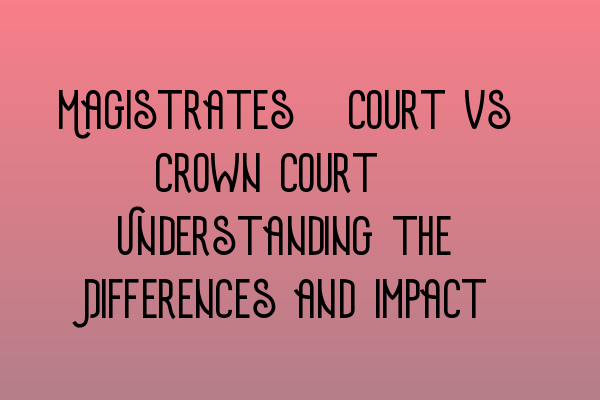Magistrates’ Court vs Crown Court: Understanding the Differences and Impact
Welcome to SQE Criminal Law & Practice Law UK! In this blog post, we will delve into the differences between Magistrates’ Court and Crown Court, and explore the impact these courts have on criminal proceedings. Understanding these distinctions is crucial for aspiring solicitors and legal professionals alike. So, let’s get started!
The Basics: Magistrates’ Court
Magistrates’ Court is the lower court in the criminal justice system. It handles less serious criminal cases and offers a quicker resolution to minor offenses. The court consists of lay magistrates, who are not legally qualified but are trained to handle a variety of cases. They are supported by a legally qualified advisor who provides guidance on legal matters.
One key advantage of Magistrates’ Court is its accessibility. It is typically located in local communities, making it easier for witnesses, defendants, and victims to attend hearings. Additionally, the cases heard in Magistrates’ Court are dealt with summarily, resulting in shorter proceedings.
However, it’s important to note that Magistrates’ Court has limited sentencing powers. They can impose fines, community orders, and custodial sentences for a maximum of 6 months for a single offense (or 12 months for consecutive offenses). More serious cases, such as murder or rape, are automatically sent to the Crown Court.
If you’re preparing for the SQE 1 exam, check out our SQE 1 Practice Exam Questions to test your knowledge on criminal law and procedure.
The Distinguishing Features: Crown Court
Crown Court is the higher court in the criminal justice system and deals with more serious criminal cases. These cases are typically those that cannot be resolved by the Magistrates’ Court due to their complexity or severity. Crown Court proceedings involve a judge, a jury, and legal professionals such as barristers and solicitors.
The role of the jury in Crown Court is crucial. It consists of 12 members of the public who are responsible for assessing the evidence presented and reaching a verdict. The judge, meanwhile, oversees the legal process, provides direction to the jury, and ultimately passes the sentence based on the jury’s decision or after a guilty plea by the defendant.
One important aspect of Crown Court is the ability to choose trial by jury. This offers a fair and transparent process that allows defendants to be tried by their peers. Additionally, the Crown Court has the power to impose longer custodial sentences for serious crimes, in some cases, even life imprisonment.
If you’re seeking practice mocks for the SQE 1 exam, our SQE 1 Practice Mocks FLK1 FLK2 are designed to help you familiarize yourself with the format and content of the exam.
Impact on Criminal Proceedings
The distinction between Magistrates’ Court and Crown Court has a significant impact on criminal proceedings. The decision to send a case to one court over the other depends on several factors, such as the severity of the offense, complexity of the case, and the defendant’s choice of trial.
Magistrates’ Court plays a crucial role in clearing the backlog of cases and ensuring swift justice for less severe offenses. Its accessibility and faster resolution make it favorable for minor cases, and it helps alleviate the workload of the Crown Court.
Crown Court, on the other hand, provides a more thorough and rigorous process for serious crimes. The involvement of a jury adds an additional layer of scrutiny and ensures fair judgment. Moreover, the Crown Court’s ability to impose longer custodial sentences acts as a deterrent against more serious criminal activities.
If you’re preparing for the SQE 2 exam, don’t miss out on our comprehensive SQE 2 Preparation Courses that cover all aspects of criminal law and practice.
Conclusion
Understanding the differences and impact of Magistrates’ Court and Crown Court is essential for aspiring solicitors and legal professionals. Both courts serve unique purposes in the criminal justice system, offering different levels of severity, accessibility, and sentencing powers.
If you’re considering a career in criminal law, ensuring that you possess a comprehensive understanding of these courts will enable you to provide the best support and advice to your clients. Stay tuned for more informative content from SQE Criminal Law & Practice Law UK.
For more information about the SQE exams and their schedules, check out our article on SRA SQE Exam Dates.
